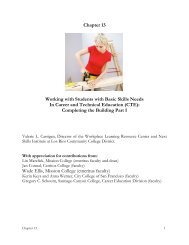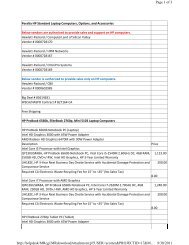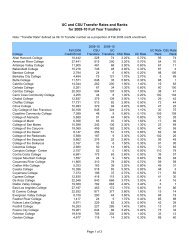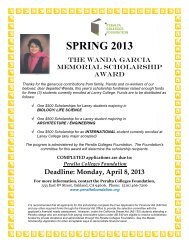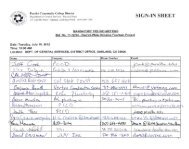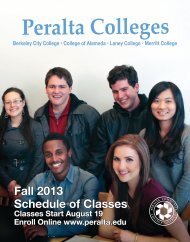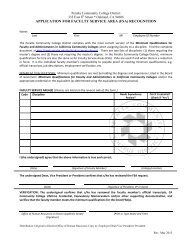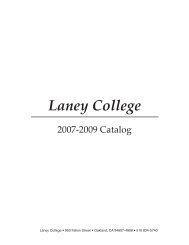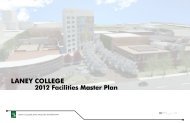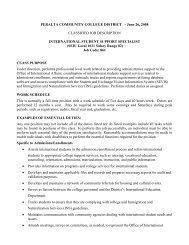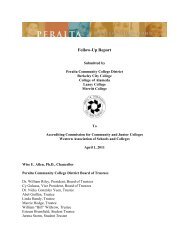COA 09-11 Catalog - Peralta Colleges
COA 09-11 Catalog - Peralta Colleges
COA 09-11 Catalog - Peralta Colleges
You also want an ePaper? Increase the reach of your titles
YUMPU automatically turns print PDFs into web optimized ePapers that Google loves.
218 district policies and proceduresbe appealed directly to the District Affirmative ActionOfficer. (BP 5.24)B. Academic Accomodation Procedures forStudents with DisabilitiesImplementing Procedures for Board Policy 5.24Pursuant to Section 504 of the Rehabilitation Act of1973, Title 5, Section 56027, and Board Policy 5.24, the<strong>Peralta</strong> Community College District has developed thefollowing procedures to respond in a timely mannerto requests by students with disabilities for academicaccommodations. Pursuant to Title 5, Sections 56000-56088the District has developed Disabled Student Programs andServices (DSP&S) at each college to assist students withdisabilities in securing appropriate instruction, academicaccommodations and auxiliary aids.The goal of all academic accommodations and auxiliaryaids is to minimize the effects of the disability on theeducational process. The student with a disability shallbe given the opportunity both to acquire informationand to be evaluated in a way that allows the studentto fully demonstrate his/her knowledge of the subject.The goal is to maintain academic standards by givingthe student assignments that are comparable in content,complexity, and quantity.1. Process to Request ServicesWhen a student requests disability-related services, thestudent’s disability is verified by the DSP&S professionalaccording to state-mandated criteria. If the student isdeemed ineligible for services and wishes to appeal thisdecision, he/she will follow the District Student GrievanceProcedure. Concurrently, the college ADA Coordinatorwill review the case and make an interim decision pendingresolution through the student grievance procedure. Thefinding of the grievance committee may be appealeddirectly to the District Affirmative Action Officer.The DSP&S professional, in consultation with the student,determines educational limitations based on the disabilityand authorizes the use of any appropriate auxiliary aidsand/or academic accommodations. These may includebut are not limited to:a. Auxiliary aids such as a tape recorder, assistivelistening device, calculator, computer, taped textor spelling checker used in the classroom and/or incompleting class assignments;b. The use in the classroom of a reader, American SignLanguage interpreter, note taker, or scribe, or realtimecaptioner for students who are deaf or hardof hearing or the presence of guide dogs, mobilityassistants, or attendants in the classroom;c. Testing accommodations such as extended time fortest taking.d. Extending the length of time permitted for course ordegree requirements and flexibility in the manner inwhich specific course content is obtained.e. Substitution for specific courses required forthe completion of general education degreerequirements, or substitutions or waivers of majoror certificate requirements.f. Access to Alternate Media such as Braille, largeprint, or electronic text (e-text).With the consent of the student, instructors are informed ofauthorized auxiliary aids and academic accommodations.It is the responsibility of the instructor to allow auxiliaryaids to be used in the classroom or to coordinate withthe DSP&S professional for the delivery of academicaccommodations. It is the responsibility of the DSP&Sprofessional to make arrangements for and facilitate thedelivery of academic accommodations with the disabledstudent in coordination with faculty, as appropriate.The DSP&S professional will assist with providing theappropriate accommodations and appropriate follow upfor DSP&S students. An example of appropriate followup might be a DSP&S Counselor contacting an instructorand DSP&S student to inquire about the effectiveness ofan accommodation.C. Grievance ProceduresIf a student is denied academic accommodations or theuse of auxiliary aids by an instructor and wishes to appeal,she/he should contact the DSP&S professional to schedulea meeting with the instructor to discuss and resolve theissue. The student may invite the DSP&S professional (i.e.,a DSP&S Coordinator, Counselor, Instructor, AcquiredBrain Injury (ABI) Specialist, Learning Disability (LD)Specialist etc.) to attend this meeting. In the case wherean unresolved issue becomes a dispute (i.e., an issue thatis not resolved informally between the student and theinstructor with the assistance of the DSP&S professional),the student may file a complaint through the DistrictStudent Grievance Procedure. Concurrently, the collegeADA Coordinator or designee will review the case andmake an interim decision pending resolution throughthe student grievance procedure. If the issue is still notresolved, the student may appeal directly to the DistrictAffirmative Action Officer.



